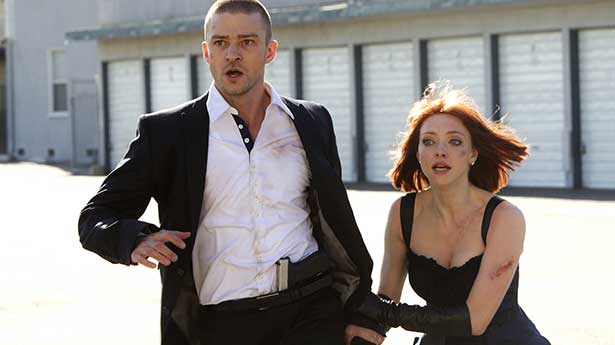In Time (2011)

In Time is a film which surmises a near-future in which time is the commodity that is traded among people in order to do such things as ride a bus, pay their rent, or buy a cup of coffee. Everyone stops aging on their 25th birthday, their bodies preserved in that state until they run out of time, which everyone is given one more year of at that fated age. The digital clock permanently glows like a neon green tattoo on every person’s arm, and one can only watch the cruel tick of time slip away with ever passing second. But there is a way to live longer — one can beg, barter, or steal their way into additional time — though that means taking time away from someone else.
In this world we follow ‘poor’ factory worker Will Salas (Timberlake, Friends with Benefits) , now 28 years old, who has spent the last three years almost literally living each day trying to find ways to keep himself, as well as his adoring mother, going for another. One day in the ‘ghetto’ where people without an abundance of time reside, he runs into a man with about a century of time in his possession (Bomer, “White Collar”) , a man who seems to be begging to have someone steal it all away. When Will saves the man, against his will, from some thugs out to take his time, the man bestows that time to Will, effectively taking his own life. Will is generous with his time with his loved ones, though the transfer of time into his own arm leads him become a murder suspect. Vowing not to waste the time he has, he becomes a champion of the poor, threatening to take down the highs and mighties that have the masses in a stranglehold.
In Time is from philosophical sci-fi wunderkind Andrew Niccol (Lord of War, S1m0ne), who has yet to live up to the expectations many genre buffs had for him after scoring successes with the screenplay for The Truman Show and his own directorial effort, Gattaca. His films are definitely creative, though they are more successful when you don’t see the wheels turning behind the machinations of the plot, and In Time practically forces viewers into the less-than-entertaining position of trying to figure out how the ‘time’ system operates, while never fully addressing the fundamental question of how this economy had come about and why many of the characters do or don’t do significant things along the way.
Timberlake isn’t the most dynamic leading man one could hope for, and Seyfried (Red Riding Hood, Letters to Juliet) exhibits little interest in support as Sylvia Weis, the spunky daughter of the wealthiest banker in the world (Kartheiser, Another Day in Paradise), with both ostensibly cast due to a certain look that Niccol has for the piece. This brings up one of the real questions about In Time — did overweight people cease to exist? Where did cell phones go for that matter? Here’s another question: what if that part of your arm gets lopped off? Or another — why don’t the people with lots of time on their hands (literally) find a low-tech way to protect some brute from just grabbing them and sapping theirs? Storage units, time keepers (cops who investigate crimes against time), and time zones are employed, but the transfer process is so easy for anyone to do, you would think that most people would have a way of blocking the capacity for someone to just force them down and sap them of all life.
Unfortunately, though not without a core intelligence in concept, and somewhat prescient in tapping the vibe that would produce the Occupy movements in various cities around the word, In Time fails in a big way in the storytelling department, a victim of its own foisting of a complex plot device that is neither adequately explained nor adequately explainable. As an allegory of how the top 1% continues to amass wealth at the expense of the bottom 99%, there’s something to the metaphor that compels, but movies are a medium of stories, and Niccol fails to tell a basic tale worthy of his high concepts. Such heady concepts are also outdone by Niccol’s sterile sense of aesthetic, where everyone is beautiful, all the vehicles have a defined look (mostly de-badged black), the time keepers wear fancy leather or trench-coats, and the protagonists can jump in and out of building windows while always maintaining perfect hair and high heels that are easy to run and jump in. One would think that Sylvia, having lived a life of relative ease and shelter, wouldn’t be the supremely athletic and rough-and-tumble gal the movie depicts. Meanwhile, they traipse through perhaps the cleanest, most spacious ghetto one might ever see.
With Niccol more concerned about ideas than direction and, more about chase sequences than explanations, and more about visual splendor than plausibility, In Time is an interesting socioeconomic statement stuffed into a vacuous, glossy action-thriller that never thrills or chills. In short, trading two hours of time isn’t worth the price of sitting through an interesting idea that never bears fruit.
Qwipster’s rating: D+
MPAA rated PG-13 for violence, some sexuality, partial nudity, and strong language
Running time: 109 min.
Cast: Justin Timberlake, Amanda Seyfried, Cillian Murphy, Vincent Kartheiser, Alex Pettyfer, Olivia Wilde, Matthew Bomer, Johnny Galecki, Matt Bomer
Director: Andrew Niccol
Screenplay: Andrew Niccol
